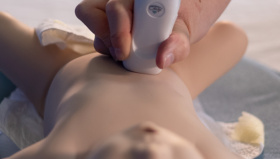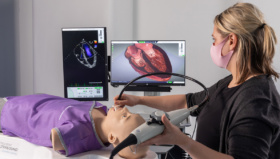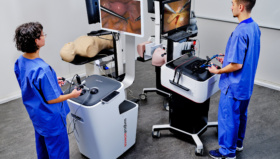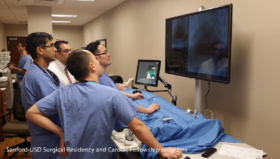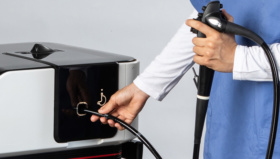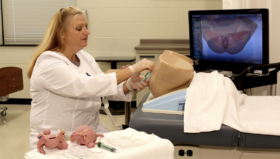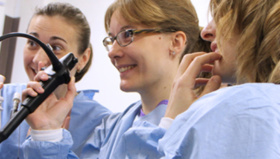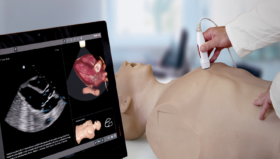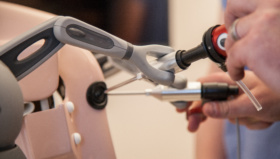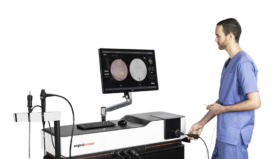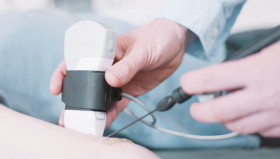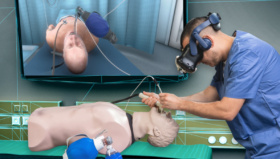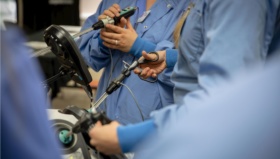When Gwinnett Technical College (Gwinnett) piloted its pediatric echocardiography course in 2023, instructors quickly identified a challenge — teaching students to capture complex pediatric heart views using adult volunteers was nearly impossible. With most students placed at adult clinical sites, exposure to pediatric pathologies was rare. The solution came in the form of BabyWorks, a high-fidelity pediatric ultrasound simulator from Surgical Science. What began as part of a trial has evolved into an integrated teaching tool – quintuplets in fact – improving skill acquisition, while preparing the next generation of pediatricians to enter the field with competence and confidence.
The Challenge
Previously an adult focused echo program, when Gwinnett launched a pilot pediatric semester, the college immediately hit some barriers. Tara Edwards, Adjunct Instructor at Gwinnett explained “Pediatric imaging is very different to adult imaging. While I was able to teach the didactic in that first course, getting pediatric cardiac views proved to be very difficult.” Indeed, Tara listed a number of challenges including:
- Limited access to pediatric patients: Students trained mostly on adult classmates or family members, none of whom had pediatric cardiac defects.
- Skill translation gap: Without practicing on pediatric anatomy, students struggled to visualize and acquire correct images, especially for rare pathologies.
- Muscle memory barriers: Even with didactic teaching and still images, students lacked the hands-on experience needed to develop correct scanning technique.
Tara continued: “A lot of the pediatric content we teach is about abnormal hearts; holes in the heart or connections that aren’t normal. To effectively convey how to assess and interrogate those types of abnormalities, we needed a platform that could show the student what the defect looks like in real time. One that also allowed me to test the student to see if they were retaining the information.”
This gap risked students graduating without the practical skills to confidently scan and diagnose pediatric patients.
The Solution
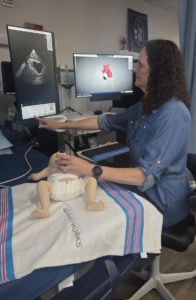
Clinical coordinator Robin Lucas identified BabyWorks as a potential solution for the pediatric course and successfully secured grant funding. Since implementation the simulator has provided Gwinnett faculty and students with:
- Realistic pediatric anatomy: A baby-sized manikin paired with ultrasound software simulating normal and pathological pediatric hearts.
- Hands-on pathology practice: The ability to scan rare conditions in a controlled, repeatable environment.
- Early skills development: First-year (“junior”) students can build muscle memory before their pediatric rotation.
- Scalable training: A portable, cost-effective solution, instructors can provide more one-to-one scanning time.
The technology has also been integrated into Children’s Healthcare of Atlanta’s (CHOA) Echo Conference and fellows’ Boot Camp, replacing live patient demos with BabyWorks stations. These structured scanning sessions have allowed participants to connect theory with practical imaging in real time.
The Results
2 years later BabyWorks is an integral part of Gwinnett’s pediatric program. Kathy Johnson, Program Director of Gwinnett’s Echo and Cardiac programs, confirmed a number of benefits the simulator has delivered:
- Improved teaching alignment: Instructors now design lessons knowing the exact views and features available in BabyWorks, immediately reinforcing didactic content with hands-on scanning.
- Greater student engagement: Students are embracing the simulator and are showing faster skill development.
- Fellowship training boost: BabyWorks offers fellows a unique opportunity to practice scanning infants with pathology without the unpredictability of real clinical cases.
There’s also been success following the CHOA Echo conference – sonographers, fellows, and physicians that attended have responded enthusiastically, validating the simulator’s relevance beyond the classroom.
What’s Next?
Due to take receipt of their 5th BabyWorks – yes, its quintuplets – the implementation and use of the simulator, while successful, is in its infancy. The next phase for Gwinnett includes:
- Formal student assessment: Integrating BabyWorks into graded practical exams for the pediatric echo course.
- Increased access: Matching simulator numbers to student groups for more direct hands-on time.
- Research potential: Gwinnett and CHOA plan to formally study whether BabyWorks shortens the learning curve for pediatric echo trainees. The College also plans to launch a study during an upcoming fellows’ Boot Camp to evaluate the impact of simulator-based training on scan competency.
With the right tools and a growing commitment to innovation, Gwinnett is redefining how pediatric echocardiography is taught — and ensuring the next generation of sonographers and physicians enter the field with the confidence and competence to handle even the most complex cases.
